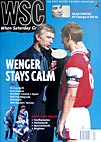 Oxford United have shirked their responsibilty on reprimanding a player convicted of a racial offence, reports James Beard
Oxford United have shirked their responsibilty on reprimanding a player convicted of a racial offence, reports James Beard
A promising young footballer was recently convicted of a racial offence. The case involves a footballer at a Second Division club and, although it touches on issues which have been at the centre of public debate, has received scant media attention. It deserves more.
In January, Ross Weatherstone, an 18-year-old central defender with Oxford United, took a taxi ride home after a night out with three friends in Reading. Racial epithets were aimed at the driver, Zafrad Naeem, and a struggle ensued which resulted in the panel screening off the driver being smashed and the taxi crashing. Zafrad Naeem ended the evening unconscious on the pavement. Weatherstone and his chums were charged with racially aggravated disorderly conduct.
At the trial in mid-August, three of the four young men – including Weatherstone – were found guilty, and fined £500 plus costs. Oxford supporters then waited for their club to take firm and decisive action of some sort. However, firm and decisive are not adjectives that can reasonably be applied to the brief statement that was released: “OUFC follows a strict policy on racial abuse and has done for many years. However, players and officials of OU support Ross Weatherstone at this difficult time.”
This “strict” policy on racism apparently means ignoring the plight of the real victim, and issuing wholly inappropriate condolences to the guilty party. It would thus seem deliberately to damage relations with local ethnic minority communities.
Unsurprisingly, many Oxford fans were angry at the statement. Many feel Weatherstone should be sacked, not cosseted. The anti-racist football body Kick It Out! accused the club of “fudging” the issue, and described the second sentence of the statement as “inane”. They called for Weatherstone either to be sacked or at least to be given a long suspension. The club entirely failed to mention the incident (or even its own statement) on the official website. Protests from supporters were ignored.
A second statement has now been released. It announced that Weatherstone would be suspended without pay for two weeks, and that he would undertake three months of community work. Since he is injured, the suspension is irrelevant, and the fine – although the maximum allowed – is one commonly imposed on players for relatively minor infringements. There are as yet no details of what his community service will entail.
“Racially aggravated” offences were introduced in the government’s Crime and Disorder Act of 1998, specifically designed to prevent racist violence and harassment. The Home Office says of such offences: “Racist crime does not simply injure the victim or their property… trust and understanding built up over many years between communities can be eroded by the climate of fear and anxiety which can surround a racist incident.”
Football is a community game, and some clubs, in conjunction with Kick It Out!, are making much-needed moves to build bridges with local ethnic communities. Inaction in a case such as this can have damaging effects on such involvement. What would a young Asian footballer think of joining Oxford now? What do the club’s handful of non-white players think?
Kick It Out! has described the punishment as “meaningless”, although local community leaders have expressed hope that it will lead to the player’s rehabilitation. It does not appear that Weatherstone will be making a public apology for his actions.
From WSC 164 October 2000. What was happening this month